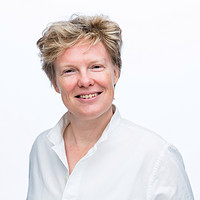Students develop eNose to combat food waste
While many students and working people in the Netherlands were on holiday in recent weeks, Rick Cohen (on the right in the photo) could be regularly found in one of the University of Twente's labs. As a third-year Saxion student, he and UT student Rens Horst researched the development of an electronic nose: a nanotechnology-based sensor that detects the first signs of food spoilage in large warehouses. Team eNose, as the duo Rick and Rens, call themselves laughing, have worked very hard and passionately on their research, which has now also taken them to the final of an annual chemistry competition for students.
Rick: “This summer project was not originally part of the Chemistry degree programme I am enrolled on. I was put in touch with Rens, who was studying Chemical Engineering at the University of Twente (UT). Our supervisors thought that we would make a good team to further develop the eNose research project. We are taking part in a national competition that is organised by Holland Chemistry every year. We received funding from NWO, which was partially intended to cover some of the costs of the research.”
The research proposal was selected and Rick and Rens’ research got underway this Summer with the aim of having a proof of concept and a report to submit by the beginning of September. The question now is whether Rick and Ren’s research will clinch a prize in the annual Chemistry Congress, Chains, in Veldhoven this December.
Our supervisors thought that we would make a good team to further develop the eNose research project.
Rens: “We are still in the running along with a duo from Wageningen, so it’s getting exciting. Rick and I are researching the chemical and technological processes that are needed to develop an eNose. Eventually this will be a sensor that detects and measures acetone gas in very low concentrations. This gas is released during the decaying process of stored food. One third of all food harvested in the world is wasted and one of the reasons for this is that much food rots or becomes spoiled during large-scale storage. For example, in huge warehouses filled with potatoes. When such a crop starts to spoil, small concentrations of the acetone gas are released. The faster you can measure these concentrations in the air, the earlier you can act to prevent food waste.”
"Saxion lecturer Cas Damen and I had been planning to give the eNose project a boost," says Sissi de Beer, assistant professor at the UT. Sissi supervised Rick and Rens last summer and is very impressed with what the research duo have achieved. “We are also working on a publication. Depending on the final measurement results, these could have the required impact, as a number of new results will be achieved. Rick and Rens, for example, are working with a new type of polymer that reacts strongly to acetone."
When such a crop starts to spoil, small concentrations of the acetone gas are released. The faster you can measure these concentrations in the air, the earlier you can act to prevent food waste.
Rens explains: “Polymer is a component of plastics. Plastics, for example in the form of a sandwich bag, all contain chains of molecules. You can give these chains a specific shape. We attach one end of the chains to a surface and make a kind of brush out of it. A kind of polymer brush that you cannot see with the naked eye which can catch a certain amount of acetone The gas remains in the brush, so to speak, and becomes easier to measure because the brush expands. Using a photonic sensor we let light flow over the expanding brush which enables us to take measurements. We are building on Cas Damen’s research, where he has already performed measurements with acetone and a photonic sensor. Our polymer brushes make it possible to identify even lower concentrations of acetone.”
Cas Damen went to the UT lab in mid-August to see how Rick and Ren’s research was going. He was impressed by the progress: “From a societal point of view, it is important to be able to detect certain gases and gas mixtures in very low concentrations quickly, easily and cheaply. Not only to detect food spoilage, but also to detect animal diseases and the development of forest fires. In practice, such a future measuring device should consist of a
series of sensors, each of which is sensitive to certain gases. The sensors ensure that a specific odour, or combination of gases, can be detected in very low concentrations.”
Rick and Rens look back positively on their summer project. “I thought we made a good team," says Rick. “I had already learned about polymers during my course, but Rens has taken me much further into the subject. I've really gone into it in great depth.” Rens, in turn, enjoyed working with Rick because of his practical approach: “I'm someone who usually thinks about the theory for a long time and is less inclined to start testing. Rick regularly said: ‘Come on, let's just do the test and see what happens.’ With Rick's practical approach, we quickly gained insight into whether something worked or not.”
We have recently been enormously encouraged to involve higher professional education students in research projects, precisely because of their practical approach.
Sissi adds that the national chemistry competition was primarily focused on university students, but there has been a visible shift in this: “We have recently been enormously encouraged to involve higher professional education students in research projects, precisely because of their practical approach. It was great to see last summer just how Rick and Rens did indeed complement each other well. This helped them make significant steps in the development of the eNose, which in turn will help us in many ways in the not so distant future, detecting odours and combating food waste.
